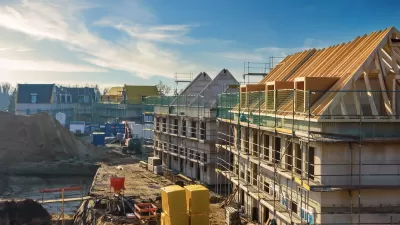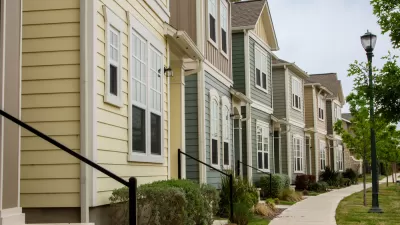Japan's system of zoning appears highly capable of fostering mixed-use, walkable neighborhoods. How does Japanese zoning differ from our own, and what factors caused those differences?

"Taken as a whole," Nolan Gray writes, "Japan's zoning system makes it easy to build walkable, mixed-use neighborhoods," making it markedly different from the prevailing American norm. "Japanese zoning is relatively liberal, with few bulk and density controls, limited use segregation, and no regulatory distinction between apartments and single-family homes."
What led to such a wide distinction between zoning in Japan and in the United States? Gray puts forward three main factors. For one thing, "the U.S. privileges real estate as an investment where Japan does not, incentivizing voters to prohibit new supply with restrictive zoning." Current law encourages homebuyers to treat their property as a way to "build wealth," standing in for a more robust social safety net. In Japan, however, homes have little resale value, fully depreciating in some cases after an average of only 22 years.
Second, Gray writes, "most public services in the U.S. are administered at the local level, driving local residents to use exclusionary zoning to 'preserve' public service quality," a process that exacerbates segregation by race and class. By contrast, Japan's local public services are standardized on the national level. The island nation compensates with high marginal tax rates and immigration policies that enforce racial homogeneity. "The desirability of the latter two policies is highly suspect, but the decoupling of public service quality from local municipal boundaries is a no brainer."
Finally, the U.S. practices "near-total deference" to local land use planning, normalizing the widespread use of discretionary permitting and magnifying the power of special interests. Japan uses an "as-of-right" system of permitting, "meaning that if a project complies with the zoning, it doesn't need to go through a discretionary review process."
"In this sense, Japanese zoning gets close to proper planning: policymakers consider upfront what type of development they would like to permit and where, and when developers come up with a conforming proposal, they hand over the needed permits."
FULL STORY: Why Is Japanese Zoning More Liberal Than US Zoning?

Alabama: Trump Terminates Settlements for Black Communities Harmed By Raw Sewage
Trump deemed the landmark civil rights agreement “illegal DEI and environmental justice policy.”

Planetizen Federal Action Tracker
A weekly monitor of how Trump’s orders and actions are impacting planners and planning in America.

The 120 Year Old Tiny Home Villages That Sheltered San Francisco’s Earthquake Refugees
More than a century ago, San Francisco mobilized to house thousands of residents displaced by the 1906 earthquake. Could their strategy offer a model for the present?

In Both Crashes and Crime, Public Transportation is Far Safer than Driving
Contrary to popular assumptions, public transportation has far lower crash and crime rates than automobile travel. For safer communities, improve and encourage transit travel.

Report: Zoning Reforms Should Complement Nashville’s Ambitious Transit Plan
Without reform, restrictive zoning codes will limit the impact of the city’s planned transit expansion and could exclude some of the residents who depend on transit the most.

Judge Orders Release of Frozen IRA, IIJA Funding
The decision is a victory for environmental groups who charged that freezing funds for critical infrastructure and disaster response programs caused “real and irreparable harm” to communities.
Urban Design for Planners 1: Software Tools
This six-course series explores essential urban design concepts using open source software and equips planners with the tools they need to participate fully in the urban design process.
Planning for Universal Design
Learn the tools for implementing Universal Design in planning regulations.
Clanton & Associates, Inc.
Jessamine County Fiscal Court
Institute for Housing and Urban Development Studies (IHS)
City of Grandview
Harvard GSD Executive Education
Toledo-Lucas County Plan Commissions
Salt Lake City
NYU Wagner Graduate School of Public Service





























